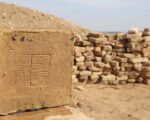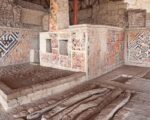Recent archaeological excavations at the ancient site of Kurd Qaburstan in Iraq have uncovered significant artifacts that offer new insights into the lives of the people of Mesopotamia. Led by Tiffany Earley-Spadoni, an associate professor of history at the University of Central Florida, the team unearthed a variety of items, including clay cuneiform tablets, a game board, and structural remains, which are believed to date back to around 1800 BCE, during the Middle Bronze Age. These artifacts are expected to provide valuable perspectives on the daily lives, literacy, and social-political structure of the people who once inhabited this ancient city. Notably, the discovery of the clay tablets is a groundbreaking find, as they are the first of their kind to be uncovered in the region.
The significance of the cuneiform tablets cannot be overstated. Initial analysis suggests that the tablets may contain important information regarding the residents of Kurd Qaburstan and the historical events that shaped their lives. The writing on the tablets could reveal much about the cultural practices, trade, and political structure of the time. Tiffany Earley-Spadoni explained that examining elements such as names, word choices, and writing styles could enhance understanding of the cultural identity and literacy levels in northern Mesopotamia. This breakthrough has the potential to rewrite parts of the historical narrative of the region, offering a more localized perspective of ancient life.
Historically, the Middle Bronze Age in northern Iraq has been under-explored due to biases in previous archaeological research and a lack of excavation activity in the area. This has left a gap in the overall understanding of this time period in Mesopotamian history. The team at Kurd Qaburstan hopes to fill this gap by focusing on the perspectives of the city’s own inhabitants, rather than relying solely on external accounts from other civilizations. This approach is set to provide a fresh and more comprehensive view of the Middle Bronze Age, shedding light on aspects of daily life, governance, and societal development that were previously overlooked.
The ongoing excavation at Kurd Qaburstan represents an exciting step forward in the study of Mesopotamian history, offering potential answers to many longstanding questions about ancient civilizations in northern Iraq. As the research progresses, further analysis of the unearthed artifacts will likely uncover more details about the people who lived in this ancient city, their cultural practices, and their interactions with neighboring societies. The findings are poised to make a significant contribution to our understanding of the ancient world and the complexities of early human civilization in the heart of Mesopotamia.

















